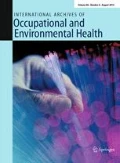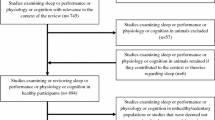Summary
The after-effects of night work on physical performance capacity and sleep quality were studied. Ten younger (age ≤ 34 years) and eight older (age > 34 years) experienced shift workers were examined. Subjects performed cycle ergometer tests at an exercise intensity requiring 70% of the individual maximal oxygen uptake. Two conditions were studied: a baseline condition, i.e. the last day of a 4 days-off period, and a recovery condition after a period of seven consecutive night shifts, i.e. the second day-off after the night-shift period (32 h after leaving the night-shift period). Sleep quality of the sleep period preceding the test was also measured for both conditions. During the recovery condition the endurance time (i.e. time to exhaustion) was reduced by an average of 20% (−160s, P < 0.05) for the older shift workers only. In both age groups exercise ventilation, heart rate, oxygen uptake, perceived exertion and sleep quality remained unaffected. These findings support the hypothesis that the aging shift worker is faced with increasing complaints, even after the night-shift period. However, to clarify the mechanisms responsible for these after-effects of night work, further extensive studies must be designed.
Similar content being viewed by others
References
Åkerstedt T (1980) Interindividual differences in adjustment to shiftwork. In: Colquhoun WP, Rutenfranz J (eds) Studies of shiftwork. Taylor & Francis, London, pp 121–131
Åkerstedt T (1984) Work schedules and sleep. Experientia 40:417–422
Åstrand I (1960) Aerobic work capacity in men and women with special reference to age. Acta Physiol 49: Suppl 169
Åstrand P-O, Rodahl K (1986) Textbook of work physiology. McGraw-Hill, New York
Åstrand I, Åstrand P-O, Hallbäck I, Kilbom A (1973) Reduction in maximal oxygen uptake with age. J Appl Physiol 35:649–654
Babcock MA, Paterson DH, Cunningham DA (1992) Influence of ageing on aerobic parameters determined from a ramp test. Eur J Appl Physiol 65:138–143
Copes K, Rosentswieg J (1972) The effects of sleep deprivation upon motor performance of ninth-grade students. J Sports Med 12:47–53
Crockford GW, Davies CTM (1969) Circadian variations in responses to submaximal exercise on a bicyle ergometer. J Physiol 191:94P-95P
Dehn MM, Bruce RA (1972) Longitudinal variations in maximal oxygen intake with age and activity. J Appl Physiol 33:805–807
Folkard S, Monk TH (1985) Hours of work: temporal factors in work-scheduling. John Wiley, Chichester
Foret J, Bensimon G, Benoit O, Vieux N (1981) Quality of sleep as a function of age and shiftwork. In: Reinberg A (ed) Night and shift work. Pergamon Press, Oxford, pp 149–154
Härmä MI, Hakola T, Laitinen J (1992) Relation of age to circadian adjustment to night work. Scand J Work Environ Health 18 [Suppl 2]:116–118
Holland GH (1968) Effects of limited sleep deprivation on performance of selected motor tasks. Res Q 39:285–294
Ilmarinen J, Ilmarinen R, Korhonen O, Nurminen M (1980) Circadian variation of physiological functions related to physical work capacity. Scand J Work Environ Health 6:112–122
Ilmarinen J, Tuomi K, Eskelinen L, Nygård C-H, Huuhtanen P, Klockars M (1991) Summary and recommendations of a project involving cross-sectional and follow-up studies on the aging worker in Finnish municipal occupations (1981–1985). Scand J Work Environ Health 17:[Suppl 1] 135–141
Knauth P, Landau K, Dröge C, Schwittec M, Rutenfranz J (1980) Duration of sleep depending on the type of shift work. Int Arch Occup Health 46:167–177
Martin BJ (1981) Effect of sleep deprivation on tolerance of prolonged exercise. Eur J Appl Physiol 47:345–354
Martin BJ, Chen H (1984) Sleep loss and the sympathoadrenal response to exericse. Med Sci Sports Exerc 16:56–59
Martin BJ, Gaddis GM (1981) Exercise after sleep deprivation. Med Sci Sports Exerc 13:220–223
McMurray RG, Brown CF (1984) The effect of sleep loss on high intensity exercise and recovery. Aviat Space Environ Med 55:1031–1035
Meijman TF, Thunnissen MJ, Vries de-Griever AGH (1990) The after-effects of a prolonged period of day-sleep on subjective sleep quality. Work Stress 4:65–70
Meijman TF, Meer van der O, Dormolen van M (1993) The after effects of night work on short-term memory performance. Ergonomics 36:37–42
Mulder-Hajonides van der Meulen WREH, Wijnberg JR, Hollander JJ, Diana De IPF, Hoofdakker van den RH (1980) Measurement of subjective sleep quality. Paper presented at the European Sleep Conference, Amsterdam
Nygård C-H, Luopajärvi T, Ilmarinen J (1991) Musculoskeletal capacity and its changes among aging municipal employees in different work categories. Scand J Work Environ Health 17 [Suppl 1]:110–117
Reilly T (1982) Investigation of circadian rhythms in metabolic responses to exercise. Ergonomics 25:1093–1107
Robinson S, Bill DB, Ross JC, Robinson RD, Wagner JA, Tzankhoff, SD (1973) Training and physiological aging in man. Fed Proc 32:1628–1634
Ryman DH, Naitoh P, Englund CE (1989) Perceived exertion under conditions of sustained work and sleep loss. Work Stress 3:57–68
Tepas DI (1982) Work/sleep time schedules and performance. In: Webb WB (ed) Biological rhythms, sleep and performance. John Wiley, Chichester
Tepas DI, Mahan RP (1989) The many meanings of sleep. Work Stress 3:93–102
Tilley AJ, Wilkinson RT, Warren PSG, Watson B, Drud M (1982) The sleep and performance of shiftworkers. Hum Factors 24:629–641
Tune GS (1969) Sleep and wakefulness in a group of shiftworkers. Br J Ind Med 26:54–58
Vidacek S, Kaliterna L, Radosevic-Vidacek B (1986) Productivity on a weekly rotating shift system: circadian adjustment and sleep deprivation effects? Ergonomics 29:1583–1590
Walsh JK, Tepas DI, Moss PD (1981) The EEG sleep of night and rotating shift workers. In: Johnson LC, Tepas DI, Colquhoun WP, Colligan MJ (eds) The twenty-four hour workday: proceedings of a symposium on variations in work-sleep schedules. NIOSH/US Gov. Printing Office, Cincinnati/Washington DC
Webb WB, Kaufman DA, Devy CM (1981) Sleep deprivation and physical fitness in young and older subjects. J Sports Med Phys Fitness 21:198–202
Wojtczak-Jaroszowa J, Banaszkiewicz A (1974) Physical work capacity during the day and at night. Ergonomics 17:193–198
Zijlstra F, Cavalini P, Wiethoff M, Meijman T (1990) Mental effort: strategies and efficiency. In: Drenth PJ, Sergeant JA, Takens J (eds) European perspectives in psychology. John Wiley, Chichester, I:435–450
Author information
Authors and Affiliations
Rights and permissions
About this article
Cite this article
de Zwart, B.C.H., Bras, V.M., van Dormolen, M. et al. After-effects of night work on physical performance capacity and sleep quality in relation to age. Int. Arch Occup Environ Heath 65, 259–262 (1993). https://doi.org/10.1007/BF00381200
Received:
Accepted:
Issue Date:
DOI: https://doi.org/10.1007/BF00381200




